The Microfiber Cleaning Cloth Market is estimated to be valued at USD 979.2 million in 2025 and is projected to reach USD 1,520.7 million by 2035, registering a compound annual growth rate (CAGR) of 4.5% over the forecast period.
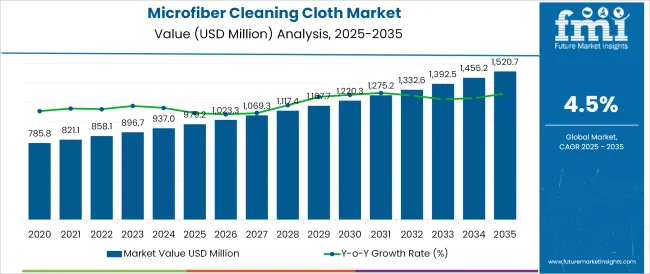
The microfiber cleaning cloth market is witnessing consistent growth due to heightened awareness around hygiene, surface sanitization, and eco-friendly cleaning alternatives. The adoption of microfiber materials characterized by their superior absorbency, lint-free application, and minimal chemical dependency is reshaping cleaning practices across households, commercial spaces, and industrial sectors.
Global shifts toward sustainable living and the phasing out of disposable wipes have accelerated the preference for reusable microfiber products. Manufacturing advancements have enabled the production of multicomponent and high-performance blends, enhancing durability and multi-surface compatibility. In parallel, e-commerce growth and retail private-label expansions are expanding market reach across developing regions.
As end-users seek long-lasting, cost effective cleaning tools with minimal environmental impact, demand for microfiber cloths is expected to rise steadily. Ongoing product innovations in weave design, antibacterial treatments, and specialized application formats are paving the way for continued segmentation and deeper market penetration across user types and price points.
The market is segmented by Raw Material, End-Use, Price Range, and Distribution Channel and region. By Raw Material, the market is divided into Multicomponent and Monocomponent. In terms of End-Use, the market is classified into Household Use, Commercial and Industrial, Healthcare, HoReCa (Hotels, Restaurants & Cafes), Commercial, Public Interest, Industrial, Car Care, Personal, Auto Repair Shop, and Car Wash Center.
Based on Price Range, the market is segmented into USD 30 - USD 60, USD 60 - USD 90, USD 90 & above, and Under USD 30. By Distribution Channel, the market is divided into Online retailing, Direct Sales, Others, and Hypermarkets/ Supermarkets. Regionally, the market is classified into North America, Latin America, Western Europe, Eastern Europe, Balkan & Baltic Countries, Russia & Belarus, Central Asia, East Asia, South Asia & Pacific, and the Middle East & Africa.
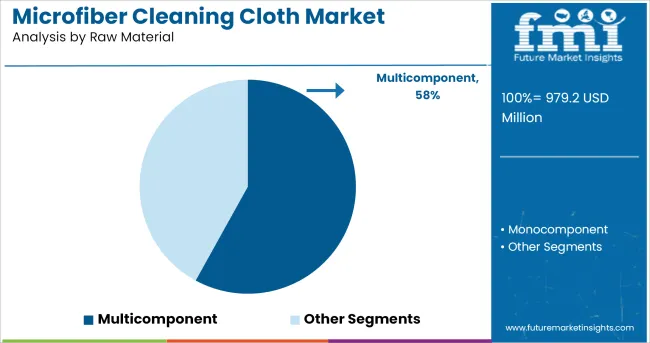
The multicomponent raw material category is expected to account for 58.0% of the total revenue share in 2025, establishing it as the dominant segment within the microfiber cleaning cloth market. This leadership stems from the enhanced functionality and superior performance characteristics delivered by multicomponent fiber structures.
These blends typically combining polyester and polyamide, offer higher absorbency, increased tensile strength, and better resistance to wear compared to single-component cloths. Multicomponent cloths also deliver a more effective cleaning experience across glass, electronic surfaces, and delicate finishes without requiring chemical agents.
The increased consumer demand for long-lasting and machine washable cloths has reinforced the need for such compositions. Manufacturers have responded by scaling production and offering value added variants that incorporate antibacterial finishes and differentiated weaves. The versatility and lifecycle advantages of multicomponent microfiber cloths continue to make them the preferred option across both residential and institutional users.
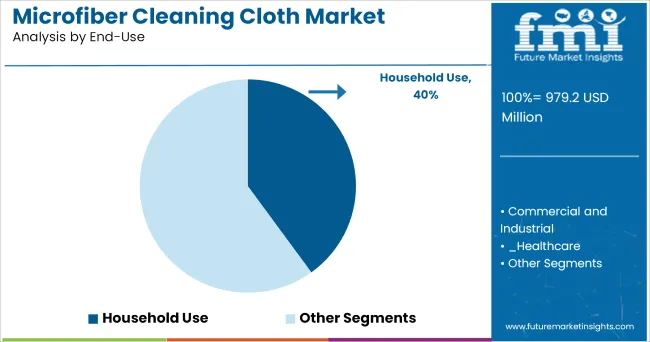
Household use is projected to hold a 40.0% revenue share in the microfiber cleaning cloth market by 2025, emerging as the leading end-use segment. This dominance is being supported by a rising focus on in-home cleanliness, particularly in kitchens, bathrooms, and high-touch areas.
Households have increasingly replaced disposable wipes and chemical heavy cleaners with reusable microfiber alternatives due to their effectiveness, lower environmental footprint, and compatibility with water-only cleaning. Growth in apartment living, home improvement spending, and hygiene-conscious consumer behaviour post-pandemic have further strengthened this segment.
Online availability of multipack microfiber cloths and awareness campaigns around sustainable cleaning have contributed to wider household adoption. Moreover, the expanding range of application-specific cloths for windows, electronics, and kitchen surfaces has increased usage frequency. With affordability reusability, and eco-alignment at the core of modern homecare, microfiber cloths have become an essential part of everyday household maintenance.
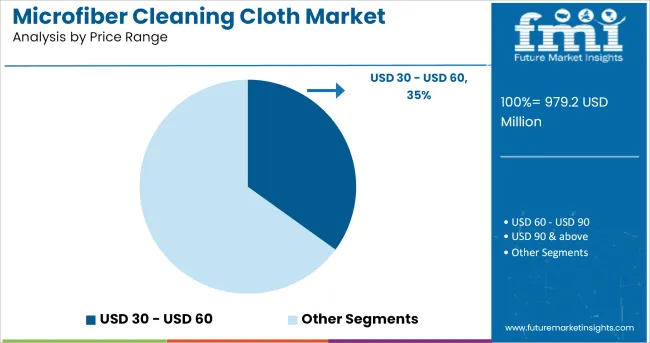
The USD 30 USD 60 price range segment is anticipated to command 35.0% of the total market revenue in 2025, securing its position as the leading price tier in the microfiber cleaning cloth market. This mid-range segment has gained preference due to its balance of affordability, quality, and multipack offerings catering to diverse cleaning needs.
Consumers are increasingly opting for bundled cloth sets that deliver value while maintaining performance standards in terms of absorption, softness, and durability. Retailers and brands have strategically positioned offerings in this bracket with enhanced packaging, branding, and value-added features such as antimicrobial treatments or ergonomic cloth textures.
This price range also accommodates premium household users without extending into the luxury segment, making it ideal for both daily use and gifting. As demand continues to shift toward durable, cost-efficient, and sustainable products, the mid-tier price point remains the strongest performer, driving volume and repeat purchase rates across geographies.
According to the latest research by Future Market Insights, the microfiber cleaning fabric market is set to witness a steady increment at a CAGR of ~4.5% during the forecast period. Microfiber is an artificial material that is made up of a blend that is finer than thread whose diameter is in micrometre.
These microfibers are used for the manufacturing of cleaning cloths. The growing awareness regarding the hygiene and cleaning and benefits of microfiber is fuelling the market growth.
The main raw material used in the manufacturing of the microfiber cleaning fabric is polyamide and polyester which helps in retaining moisture through direct contact. This cloth also has large durability and electrostatic and filtering properties that make it capable of cleaning surfaces easily.
This is some advantage of the cloth that is anticipated to fuel the market growth of the microfiber cleaning fabric during the forecast period.
Microfiber cleaning fabric has become the most common choice of people due to the excellent performance of blend of polyester and polyamide like bio-degradation, hygroscopic nature, regeneration, and softness. Furthermore, the increasing demand for a cleaning solution in the residential as well as commercial sector increases the sales of this cloth.
Furthermore, people are more excited to use cleaning cloth made with microfiber because this single cloth has multiple uses such as the ability to polish the glass and mirror, cleaning up spills, and even the toughest stains, wiping countertops, drying plates and cooking utensils, cleaning windows, and dust. Hence, this microfiber cleaning material substitutes in place of all other materials used for cleaning purposes.
With the growing urbanization, people living extravagant life around the globe are spending on household care products like microfiber cleaning material, which is propelling its growth in the market.
Along with this, microfiber cleaning material has the ability of super absorption technology, that is, this cloth is made up of polymer that collects liquid and dirt up to ten times its weight. And also, has a tendency to dry in the air. That is why this type of cleaning cloths are in trend in the market.
Furthermore, customers are more attracted to origami non-woven cleaning cloths because these types of clothes are easy to wash and clean the wet surface efficiently. Such advancement gives a positive impact on the market growth.
Moreover, this cloth lowers the chances of slipping, especially kids and elder people because these clothes are unlike traditional mop that takes time to dry this cloth is dry faster and no trace of water is left behind.
This is another factor that is expected to propel its sales in future and help the players to strengthen their presence in the market.
In the outbreak of the novel COVID-19 pandemic, the manufacturing industries are either temporarily halted or are opened with a minimum workforce because of the imposed restrictions or the enforced lockdown by the regional governments.
Also, the changing consumer buying preference affects the microfiber cleaning fabric market. Moreover, the non-renewable and non-biodegradable properties of the cloth is a factor that may impede the growth of the market in the coming years.
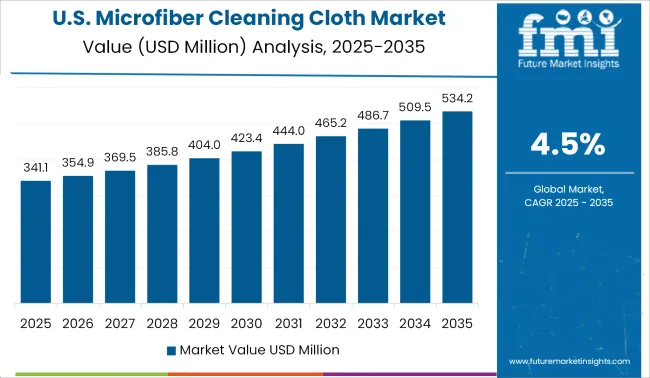
The changing lifestyle and growing population index of the USA and Canada are prominent reasons for the increment in the number of hotels and restaurants in the region which is driving the demand for microfiber cleaning fabric.
This cloth is very helpful in the kitchens. This cloth is used for wide purposes, like keeping the kitchen clean, drying hands and cleaning dishes, cutting boards, knives and also, used for cleaning glass and mirrors in the hotels as it is smear-free and lint-free.
Furthermore, the people of the USA generally have a shortage of time because both males and females are doing jobs in the region, so they generally prefer cleaning cloth made up of microfiber because this cloth is easy to wash and dry.
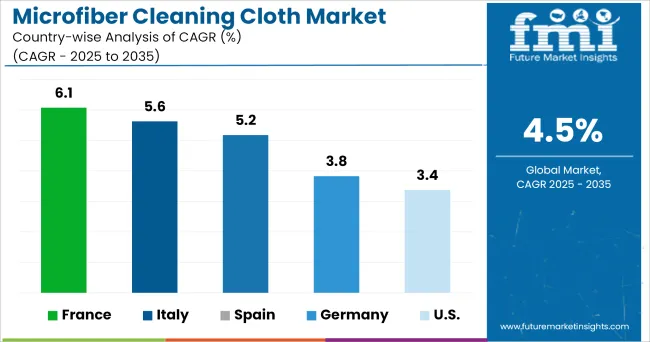
The most technologically advanced generations are thought to be the youngest ones. They are also environmentally conscious and advocate for the usage of sustainable products. Teenagers in Europe are enthusiastic about lowering their carbon impact and promoting long-term sustainability.
They are more likely to alter their behaviour in order to lessen their carbon footprint or to support eco-friendly businesses. That is why they are trying to avoid cleaning cloths made up of synthetic chemicals and contains toxic dyes.
They have therefore shifted their choices towards cleaning cloth made up of microfibers. This cloth has reusable microfiber cleaning with no harmful chemicals for the health of people, the well-being of their families, and the sustainability of the planet.
Furthermore, these microfiber cloths are used in the medical sector and laboratories in the region because they have the ability to trap particles of dirt that would be missed by other cleaning materials. Also, this reduces the expenses of chemical cleaning in the sector.
Apart from this, microfiber cleaning material featuring a long-lasting and durable design. Considering the factors above Europe might be suitable for setting up the cleaning cloth industry as it can provide more profits for the players.
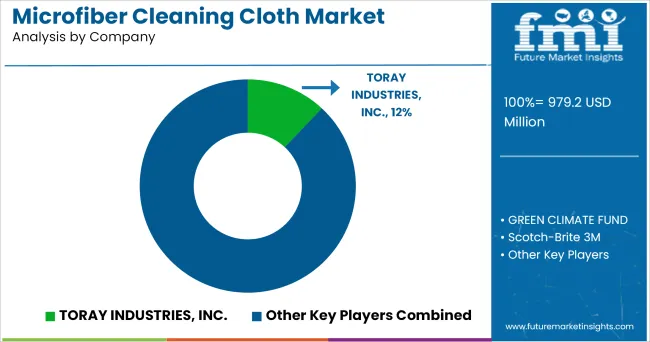
Some of the leading manufacturers and suppliers of microfiber cleaning fabric include:
The report is a compilation of first-hand information, qualitative and quantitative assessment by industry analysts, inputs from industry experts and industry participants across the value chain.
The report provides in-depth analysis of parent market trends, macro-economic indicators and governing factors along with market attractiveness as per segments. The report also maps the qualitative impact of various market factors on market segments and geographies.
The global microfiber cleaning cloth market is estimated to be valued at USD 979.2 million in 2025.
The market size for the microfiber cleaning cloth market is projected to reach USD 1,520.7 million by 2035.
The microfiber cleaning cloth market is expected to grow at a 4.5% CAGR between 2025 and 2035.
The key product types in microfiber cleaning cloth market are multicomponent and monocomponent.
In terms of end-use, household use segment to command 40.0% share in the microfiber cleaning cloth market in 2025.






Our Research Products

The "Full Research Suite" delivers actionable market intel, deep dives on markets or technologies, so clients act faster, cut risk, and unlock growth.

The Leaderboard benchmarks and ranks top vendors, classifying them as Established Leaders, Leading Challengers, or Disruptors & Challengers.

Locates where complements amplify value and substitutes erode it, forecasting net impact by horizon

We deliver granular, decision-grade intel: market sizing, 5-year forecasts, pricing, adoption, usage, revenue, and operational KPIs—plus competitor tracking, regulation, and value chains—across 60 countries broadly.

Spot the shifts before they hit your P&L. We track inflection points, adoption curves, pricing moves, and ecosystem plays to show where demand is heading, why it is changing, and what to do next across high-growth markets and disruptive tech

Real-time reads of user behavior. We track shifting priorities, perceptions of today’s and next-gen services, and provider experience, then pace how fast tech moves from trial to adoption, blending buyer, consumer, and channel inputs with social signals (#WhySwitch, #UX).

Partner with our analyst team to build a custom report designed around your business priorities. From analysing market trends to assessing competitors or crafting bespoke datasets, we tailor insights to your needs.
Supplier Intelligence
Discovery & Profiling
Capacity & Footprint
Performance & Risk
Compliance & Governance
Commercial Readiness
Who Supplies Whom
Scorecards & Shortlists
Playbooks & Docs
Category Intelligence
Definition & Scope
Demand & Use Cases
Cost Drivers
Market Structure
Supply Chain Map
Trade & Policy
Operating Norms
Deliverables
Buyer Intelligence
Account Basics
Spend & Scope
Procurement Model
Vendor Requirements
Terms & Policies
Entry Strategy
Pain Points & Triggers
Outputs
Pricing Analysis
Benchmarks
Trends
Should-Cost
Indexation
Landed Cost
Commercial Terms
Deliverables
Brand Analysis
Positioning & Value Prop
Share & Presence
Customer Evidence
Go-to-Market
Digital & Reputation
Compliance & Trust
KPIs & Gaps
Outputs
Full Research Suite comprises of:
Market outlook & trends analysis
Interviews & case studies
Strategic recommendations
Vendor profiles & capabilities analysis
5-year forecasts
8 regions and 60+ country-level data splits
Market segment data splits
12 months of continuous data updates
DELIVERED AS:
PDF EXCEL ONLINE
Cleaning Robot Market Size and Share Forecast Outlook 2025 to 2035
Cloth Drying Machine Market Size and Share Forecast Outlook 2025 to 2035
Clothing Fibers Market Size and Share Forecast Outlook 2025 to 2035
Cleaning In Place Market Growth - Trends & Forecast 2025 to 2035
Cloth Diaper Market Analysis by Type, Application,Distribution Channel and Region Through 2025 to 2035
Clothing Recycling Market Analysis – Growth & Trends 2025 to 2035
The Microfiber Synthetic Leather Market is segmented by material, application, and end-use from 2025 to 2035
Cleaning and Hygiene Product Market Report – Demand & Trends 2024-2034
Cloth Self-adhesive Tapes Market
Cloth Cutting Machines Market
Wet Cleaning Ozone Water System Market Size and Share Forecast Outlook 2025 to 2035
Dry Cleaning Solvents Market Size and Share Forecast Outlook 2025 to 2035
Pet Clothing Market Size and Share Forecast Outlook 2025 to 2035
GMP Cleaning Services Market Analysis Size and Share Forecast Outlook 2025 to 2035
Dry-Cleaning and Laundry Services Market Growth, Trends and Forecast from 2025 to 2035
Sailcloth Market Growth – Trends & Forecast 2022 to 2032
Self-Cleaning Bottle Market Analysis - Trends, Growth & Forecast 2025 to 2035
Drop Cloth Market Analysis - Trends, Growth & Forecast to 2035
Hand Cleaning Accessories Market
Sewer Cleaning Hose Market Size and Share Forecast Outlook 2025 to 2035

Thank you!
You will receive an email from our Business Development Manager. Please be sure to check your SPAM/JUNK folder too.
Chat With
MaRIA